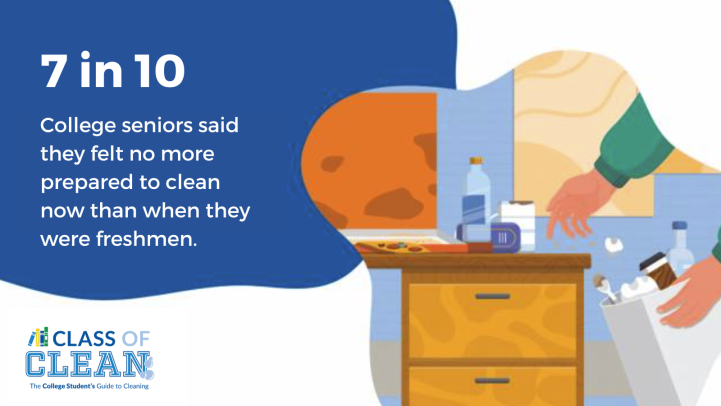
- ACI introduces the Class of Clean: Senior Year with New Resources and Tools to Prepare for Life After Graduation
- Review Survey Findings Here
- Download the toolkit: www.cleaninginstitute.org/ClassOfClean
Nearly 7 out of 10 college seniors (68%) said they felt no more prepared to clean as seniors as they did when they were freshmen, according to a new survey from the American Cleaning Institute (ACI). These findings show that seniors still have to pass cleaning 101 before transitioning to the next phase of life.
ACI is kicking off the Class of Clean: Senior Year with new resources and information aimed at preparing college seniors for life and living situations on and off campus as well as life post-grad.
The ACI survey -- conducted by Wakefield Research -- looked at college seniors cleaning habits and perceptions. Despite the lack of cleaning comprehension, students’ motivation to clean includes creating peaceful surroundings (49%) and focusing on their schoolwork (45%). While nearly half of students are cleaning for themselves, nearly 8 in 10 (77%) are motivated by peer pressure including roommates, friends, and making a good first impression for a date.
To help address these various motivators to clean, ACI’s Class of Clean: A College Student’s Guide to Cleaning toolkit helps educate college students on essential cleaning basics. To emphasize the importance of cleaning, especially as students prepare to graduate, ACI is expanding these resources during the Class of Clean: Senior Year.
“Even for students entering their last year of college, many do not feel adequately prepared when it comes to cleaning and laundry basics,” said Brian Sansoni, ACI Senior Vice President, Communications. “There’s still time to learn. ACI’s Class of Clean provides easy-to-follow tips and tricks will set them up for success and prepare them for any cleaning task.”
While there is pressure to keep their room tidy, students often overlook how cleaning plays a critical role in creating a healthy living space with only 38% citing avoiding illnesses as their cleaning motivation. This is particularly concerning because college campuses are hotspots for germs that can lead to illness. In fact, more than 1 in 3 (34%) of students will have at least one respiratory illness such as a cold or the flu each year. As a result, the CDC also recommends regular cleaning as a crucial measure for preventing the spread of these germs.
As a part of ACI’s larger Cleaning is Caring initiative, ACI is committed to emphasizing the connection between cleaning and health and safety by offering resources to not only impress your date but also to stay healthy, including:
No matter where you are in your college journey, cleaning plays a critical role. For more cleaning advice and guidance visit www.cleaninginstitute.org/classofclean or follow @CleaningInstitute on TikTok.
The American Cleaning Institute® (ACI – www.cleaninginstitute.org) is the Home of the U.S. Cleaning Products Industry® and represents the $60 billion U.S. cleaning product supply chain. ACI members include the manufacturers and formulators of soaps, detergents, and general cleaning products used in household, commercial, industrial and institutional settings; companies that supply ingredients and finished packaging for these products; and chemical distributors. ACI serves the growth and innovation of the U.S. cleaning products industry by advancing the health and quality of life of people and protecting our planet. ACI achieves this through a continuous commitment to sound science and being a credible voice for the cleaning products industry.
Methodological Notes:
The ACI Class of Clean Survey was conducted by Wakefield Research (www.wakefieldresearch.com) among 500 US college seniors or rising US college seniors, between May 13th and May 21st, 2024, using an email invitation and an online survey. Results of any sample are subject to sampling variation. The magnitude of the variation is measurable and is affected by the number of interviews and the level of the percentages expressing the results. For the interviews conducted in this particular study, the chances are 95 in 100 that a survey result does not vary, plus or minus, by more than 4.4 percentage points from the result that would be obtained if interviews had been conducted with all persons in the universe represented by the sample.